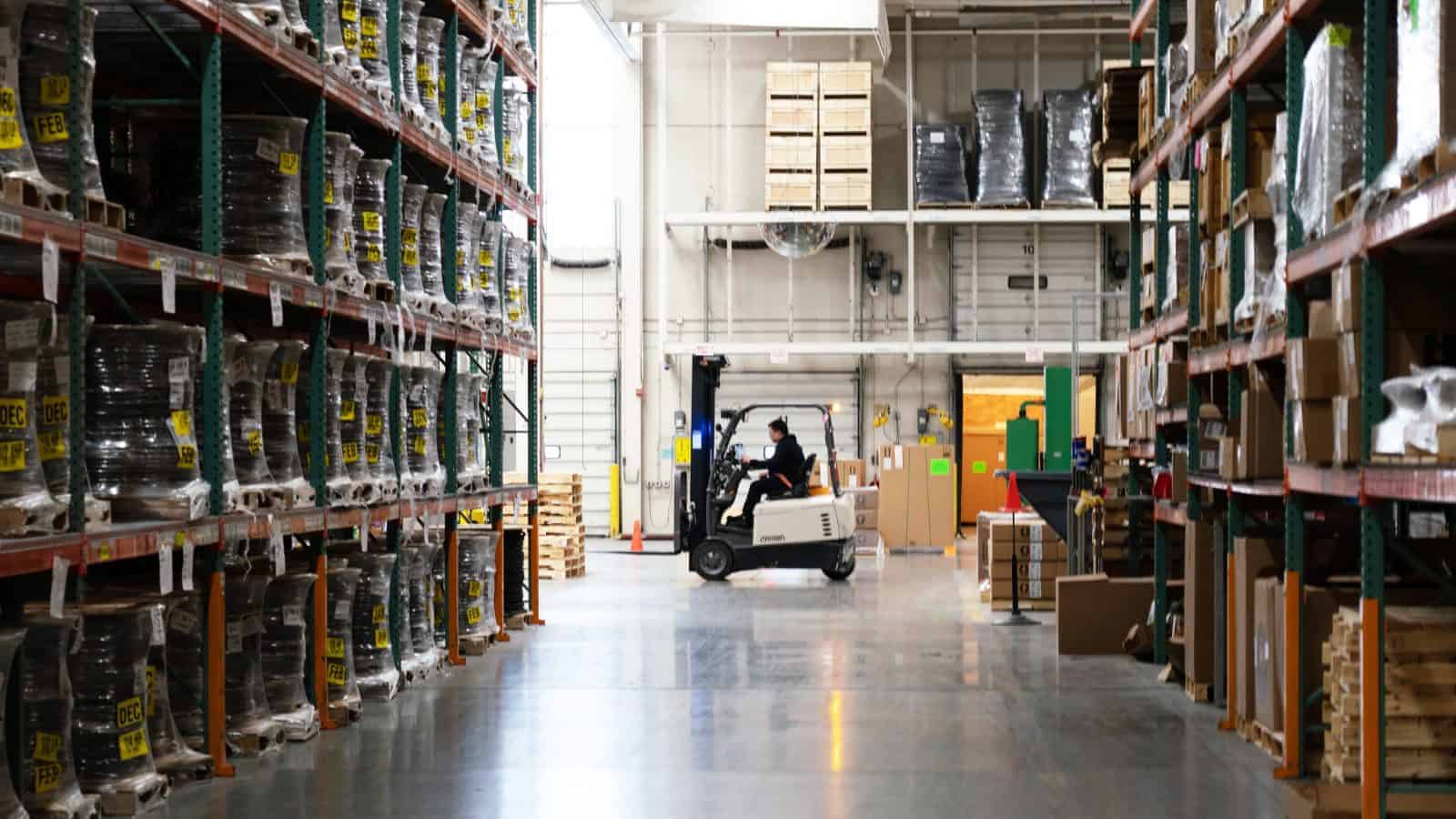Survey: Manufacturers’ Optimism Drops, Signaling Urgent Need to Pass Tax Bill
Washington, D.C. – The National Association of Manufacturers released its Q2 2025 Manufacturers’ Outlook Survey, revealing that optimism among manufacturers across the country has dropped sharply. Only 55.4% of respondents report a positive outlook for their companies—a nearly 15-percentage-point drop from Q1 and the lowest level since the height of the COVID-19 pandemic in Q2 of 2020.
The survey conducted earlier this month revealed that 85.4% of manufacturers believe Congress should preserve pro-growth tax policies in response to trade uncertainty.
Trade uncertainty remained the top business concern for the second consecutive quarter, cited by 77.0% of respondents, followed by increased raw material costs, which was cited by 66.1% of respondents.
“These numbers are yet another indicator that manufacturers need increased policy certainty. Congress must act urgently to preserve tax reform and empower manufacturers to make the long-term investments that drive the American economy,” said NAM President and CEO Jay Timmons. “The stakes are high: preserving tax reform will prevent the loss of 6 million jobs and avoid a $1 trillion hit to the economy—that’s why manufacturers are calling on the Senate to preserve pro-manufacturing tax policies from the House-passed reconciliation bill, while also taking steps to ensure the final package is maximally beneficial for our industry. Pro-manufacturing tax policies are a critical component of a comprehensive manufacturing strategy; this quarter’s results also show that manufacturers need a strategic approach to trade policy that allows our industry to reduce costs and access the inputs we need to make things in America.”
The NAM releases these results to the public each quarter. Further information on the survey is available here.
-NAM-
The National Association of Manufacturers is the largest manufacturing association in the United States, representing small and large manufacturers in every industrial sector and in all 50 states. Manufacturing employs nearly 13 million men and women, contributes $2.93 trillion to the U.S. economy annually and accounts for 53% of private-sector rese arch and development. The NAM is the powerful voice of the manufacturing community and the leading advocate for a policy agenda that helps manufacturers compete in the global economy and create jobs across the United States. For more information about the NAM or to follow us on Twitter and Facebook, please visit www.nam.org.
Court Strikes Down Trump’s “Reciprocal” Tariffs

The U.S. Court of International Trade, which hears disputes involving international trade and customs laws, struck down President Donald Trump’s International Emergency Economic Powers Act tariffs yesterday.
What happened: In a unanimous opinion, the three-judge panel found that the IEEPA “does not authorize the President to impose unbounded tariffs” and the administration exceeded its authority in imposing the “reciprocal” and fentanyl IEEPA tariffs.
What it means: The finding strikes down the 10% baseline additional “reciprocal” tariffs announced on April 2 as well as the “reciprocal” tariffs of between 20% and 50% on another 65 or so trading partners with which the U.S. runs trade deficits.
- Those tariffs that are currently “paused” were scheduled to snap back into place on July 9 if trade deals were not reached by then.
- The court further nullified the 25% fentanyl IEEPA tariffs on products from Canada and Mexico and the 20% fentanyl IEEPA tariff on products from China.
Refunds? The court also ordered that the IEEPA tariffs collected so far be “vacated,” raising questions about possible refunds.
- The court gave Customs and Border Patrol 10 days to implement the ruling, but the U.S. government may ask for a stay of enforcement—relieving the government of obligation to issue refunds—pending appeal, which could result in CBP continuing to collect but not liquidate tariffs.
An appeal: The DOJ quickly filed an appeal with the U.S. Court of Appeals for the Federal Circuit, and said that it may ask the Supreme Court to pause the ruling as soon as Friday.
Section 232: The ruling does not affect other tariffs the administration has or might impose under Section 232 of the Trade Expansion Act of 1962 on national security grounds.
Manufacturers: U.S.–U.K. Deal Good First Step; Push for a Final Zero-for-Zero Tariff Deal
Washington, D.C. – On the 80th anniversary of Victory in Europe Day, National Association of Manufacturers President and CEO Jay Timmons released the following statement today in response to President Trump’s newly announced trade agreement with the United Kingdom—the first deal since the administration’s recent shift in global tariff policy last month:
“This is a strong start—but not the finish line. The NAM has long advocated for a comprehensive market-opening trade agreement with the U.K., and we welcome this initial commitment to work together to expand industrial market access—to create more manufacturing jobs and strengthen security on both sides of the Atlantic. This framework provides a meaningful foundation—but much more remains to be done. We will continue urging both governments to deliver a full zero-for-zero tariff agreement on all industrial goods at the end of these negotiations so that manufacturers have the certainty they need to plan, hire and compete.
“The U.K. is the fifth-largest market for U.S.-manufactured goods exports. In 2024 alone, manufacturers exported $61.6 billion in manufactured goods. At the same time, $58 billion in critical inputs—spanning automotive parts, pharmaceutical preparations and construction machinery—were imported from the U.K. to power U.S. production. In some sectors, up to 99% of these transactions are between related parties, underscoring the deeply integrated nature of our supply chains.
“Despite this integration, the administration has left the so-called ‘reciprocal’ tariff at 10% for many inputs necessary to keep Americans working. That’s why the NAM continues to call for zero-for-zero tariffs—adding certainty to strengthen competitiveness, lessen price pressures and support growth.
“We also see potential promise in the administration’s efforts to negotiate tailored arrangements on Section 232 tariffs on autos, steel and aluminum, with like-minded partners who share our national economic security interests.
“As the president indicated, we look forward to seeing full written details of the agreement in the coming weeks. With additional deals on the table—and just 61 days to act on the other 89 agreements—we need certainty and urge the administration to maintain momentum and deliver even more for manufacturers so they can invest, plan, hire and compete in America. At the same time, we urge Congress to make the 2017 tax reforms permanent now. If we see more trade agreements, tax reform legislation and more regulatory certainty—as part of our comprehensive manufacturing strategy—manufacturers win. And when manufacturers win, America wins.”
The Background
The NAM has led efforts to deepen U.S.–U.K. manufacturing ties for years. In Spring 2023, Timmons traveled to London to build support for a new trade accord and signed a memorandum of understanding with Make UK to strengthen bilateral manufacturing cooperation. The NAM has remained focused on core priorities, including:
- The elimination of tariffs and nontariff barriers;
- Strong digital trade commitments;
- Robust engagement on intellectual property issues;
- Collaboration on standards, technical regulations, testing procedures and conformity assessment; and
- Ensuring stronger alignment on customs procedures and approaches.
-NAM-
The National Association of Manufacturers is the largest manufacturing association in the United States, representing small and large manufacturers in every industrial sector and in all 50 states. Manufacturing employs nearly 13 million men and women, contributes $2.93 trillion to the U.S. economy annually and accounts for 53% of private-sector research and development. The NAM is the powerful voice of the manufacturing community and the leading advocate for a policy agenda that helps manufacturers compete in the global economy and create jobs across the United States. For more information about the NAM or to follow us on Twitter and Facebook, please visit www.nam.org.
Manufacturers Share Immediate Impacts Under Latest Tariffs
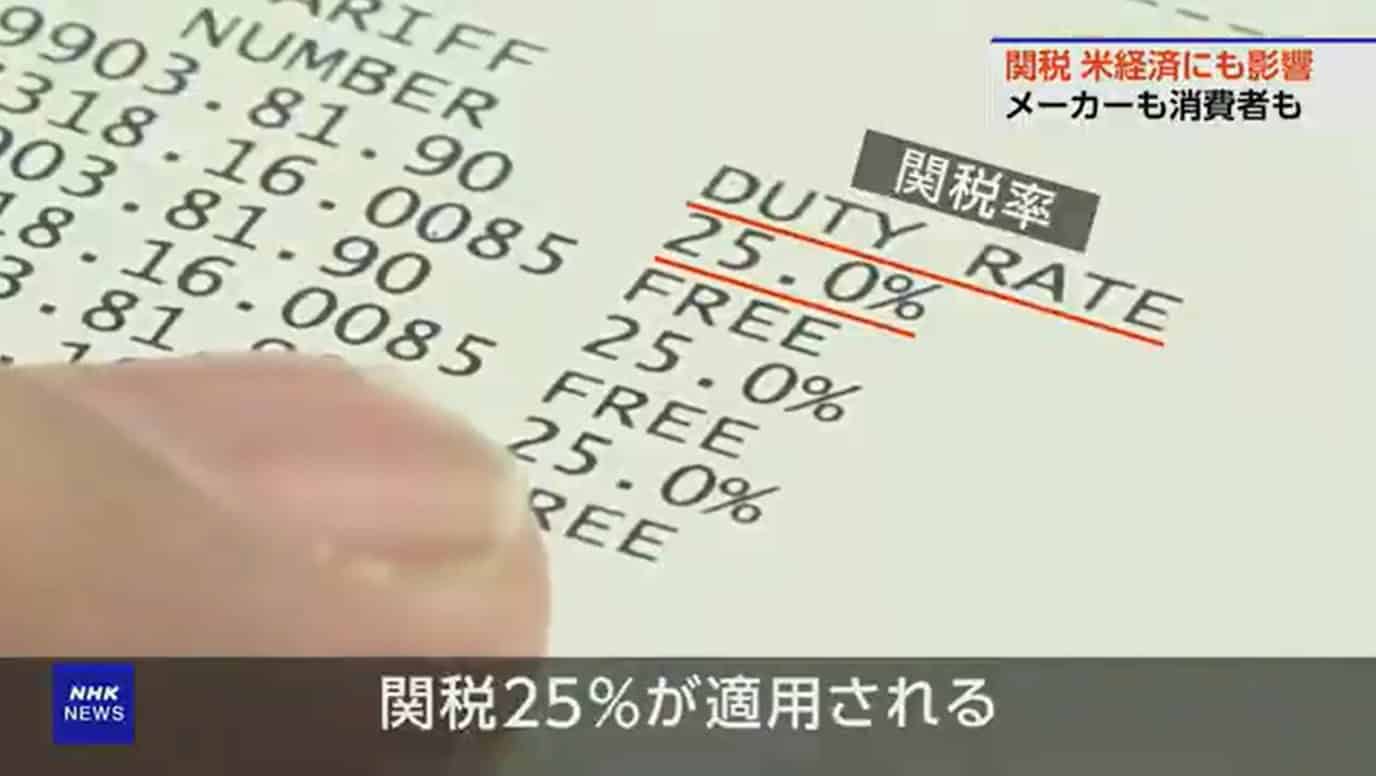
As three of the largest U.S. retailers—Walmart, Home Depot and Target—this week warned President Trump that his tariff policy could empty store shelves within weeks, upend supply chains and raise consumer prices, the tariffs already in place on imported goods are having effects on those who make things in America.
Speaking up: Manufacturers in the U.S. are sharing their stories of increased cost pressures and uncertainty, both the result of new tariffs. Makers of everything from machinery to bicycles to food service equipment are reporting ill effects.
- For Craig Souser, president and CEO of robotic packaging solutions manufacturer JLS Automation in York, Pennsylvania, steel tariffs in particular have had a big—and negative—effect on business.
- “[W]e’re seeing increased costs [in steel] that will eventually get passed along to the customer,” Souser told the York Dispatch (subscription).
“Writing the checks”: Chuck Dardas, president and chief operating officer of Michigan automotive parts manufacturer AlphaUSA, told NHK News recently that his small business and others like it are the ones “writing the checks for” the new tariffs—and it’s not something they can keep up.
- “To absorb 25% or 50% in tariffs, it’s a task that we cannot in the long term endure,” Dardas said. “It’ll cause our company and many other companies our size to probably go out of existence.”
The unknown: Perhaps the hardest part about the new tariffs: the uncertainty they bring, NAM board member Lisa Winton, CEO and co-owner of Georgia-based machinery maker Winton Machine Company, told NPR earlier this month.
- “We just noticed our first invoice that had a tariff line on it,” she said. “There’s just so much unknown right now, and I think that’s the most difficult thing—to make decisions for your company financially when you just don’t know all the pieces to the puzzle.”
No time: Arnold Kamler, chairman of Kent International, a New Jersey bicycle manufacturer, told Fox Business last week that while his business was already moving overseas production to the U.S. when tariffs hit, it has yet to complete the move—and that’s been a problem for his small outfit.
- “We’ve managed to move almost half of our production out of China already, but that’s only [almost] half,” he said. “We need more time. … [W]e’re a small company.”
- During the pandemic, “[e]verybody bought a bicycle”—but “things got very slow after that. … All the money we made during the pandemic is all gone, plus a lot more. Then we have these tariffs. [If the Trump administration had said], ‘Look … in nine months, 10 months, this will be the tariff,’” that might have been doable, he went on. “But we g[ot] two weeks’ notice. It’s impossible to run a company to plan for” that.
Passing on the costs: In Ohio, Wasserstrom Company President Brad Wasserstrom told 10 WBNS that his Columbus-based food service and supply company will most likely have to raise customer prices to pay for the new tariffs.
- “[W]e’re negotiating with suppliers when we can, if there’s any flexibility in what they’re passing on to us,” Wasserstrom said. “Some have been able to do something to help us out. They’re not passing through maybe the full tariff. But very few have said they’re going to pass on nothing.”
90-Day Pause on Country-Specific “Reciprocal” Tariffs: What You Need to Know

On Wednesday, President Trump announced a 90-day pause of country-specific “reciprocal” tariffs above 10%, setting the “reciprocal” tariff rate at a flat 10%. However, he also announced an increase of additional “reciprocal” tariffs on Chinese imports, to 125%. The NAM’s trade team has the exact details for us.
Ninety days to negotiate: Trump’s executive order temporarily resets the additional country-specific ad valorem tariffs listed in Annex I of the April 2 executive order to a common 10% baseline, though previous exceptions still apply.
- The new rates went into effect on April 10, and the temporary reset applies until July 9, 2025, while the administration negotiates trade deals.
Higher tariffs on China: In response to China’s retaliation, the executive order increases tariffs on imports from China (and its administrative regions Hong Kong and Macau) into the U.S. from 84% to 125% as of April 10.
- The 125% rate is on top of the 20% additional rate on Chinese imports issued on Feb. 1, and in addition to any applicable Section 301 tariffs, Section 232 tariffs, MFN tariffs and AD/CVD tariffs.
De minimis: The April 2 EO laid out a new scheme for collecting tariffs on Chinese goods that would otherwise have been eligible for duty-free de minimis treatment, being valued at or below $800.The A pril 10 EO amends the previous order as follows:
- From May 2, 2025, the tariff on postal items is increased from 90% to 120% of the package’s value or a flat fee per postal item.
- The flat fee is increased from $75 to $100.
- This flat fee was set to increase to $150 on June 1, 2025. This fee is now increased from $150 to $200.
Trump Doubles Down on Tariff Posture
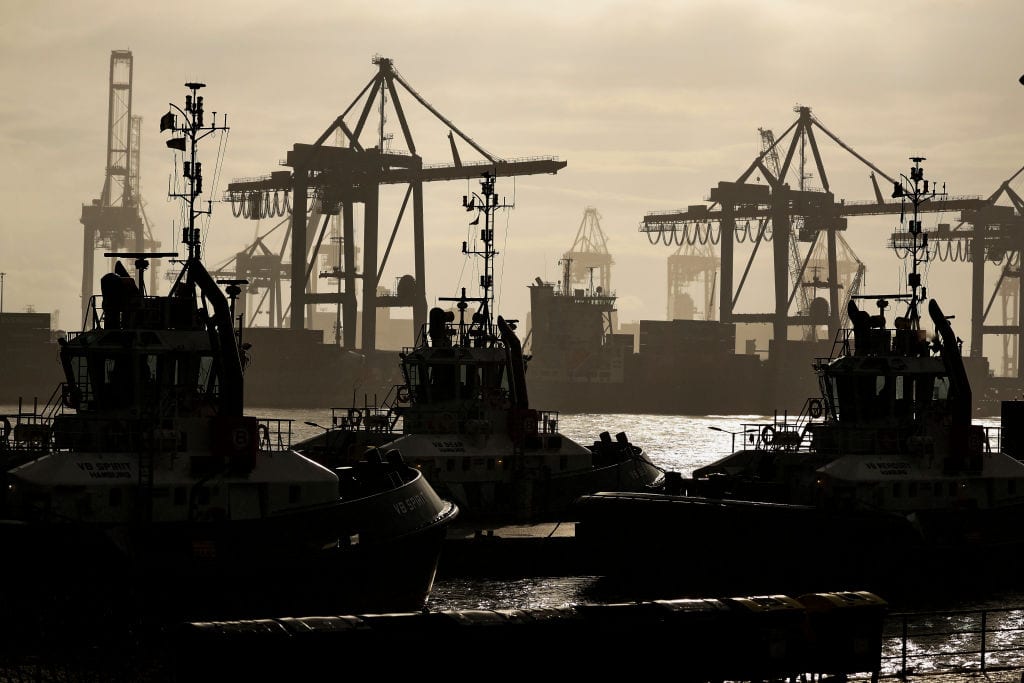
President Donald Trump is going all-in on tariffs—leading to volatility for markets, manufacturers and America’s trading partners.
Weekend update: Over the weekend, the president called the sweeping new trade actions “an economic revolution,” urging supporters on Truth Social to “HANG TOUGH.” By Monday, he was threatening an additional 50% tariff on China by Wednesday unless it reverses its retaliatory moves. “All talks with China concerning their requested meetings with us will be terminated!” he said.
Behind the scenes: According to the administration, more than 50 countries have reached out to open tariff negotiations, but multiple sources say that there’s no structured process. “The phone lines are open,” a White House official said. “But for businesses looking for certainty, the message is clear: Don’t wait, come build in America.”
From tariffs to structural demands: Manufacturers hoping that a tariff deal could end the standoff may be disappointed. On CNBC’s “Squawk Box,” White House trade adviser Peter Navarro dismissed Vietnam’s proposed zero-tariff deal as “meaningless” without changes to what he called “non-tariff cheating”—ranging from value-added tax systems to intellectual property theft and product dumping.
- Later in the interview, he amended this statement somewhat, saying zero tariffs would be “a small first start.” “The goal here, ultimately, is to have people make things here,” he added.
- Navarro also claimed that the tariffs would lead to “the biggest tax cut in American history.”
Zoom In: While Navarro predicted a market rebound and eventual growth, businesses are still waiting for clarity.
Global reactions: EU officials announced plans to negotiate but warned of countermeasures and new import surveillance. Yesterday, Israel held in-person talks with President Trump. China has responded by devaluing the yuan against the dollar and promising to “fight to the end” of a trade war.
What it means for you: The NAM is calling for smart, strategic trade policy—solutions that restore certainty, strengthen U.S. manufacturing and protect supply chains.
- As NAM President and CEO Jay Timmons said: “The high costs of new tariffs threaten investment, jobs, supply chains and, in turn, America’s ability to outcompete other nations and lead as the preeminent manufacturing superpower.”
- The NAM is actively engaging policymakers, elevating member voices and providing key data and inputs on trade actions that put manufacturing growth at risk.
NAM: Comprehensive Manufacturing Strategy, Not Increased Costs
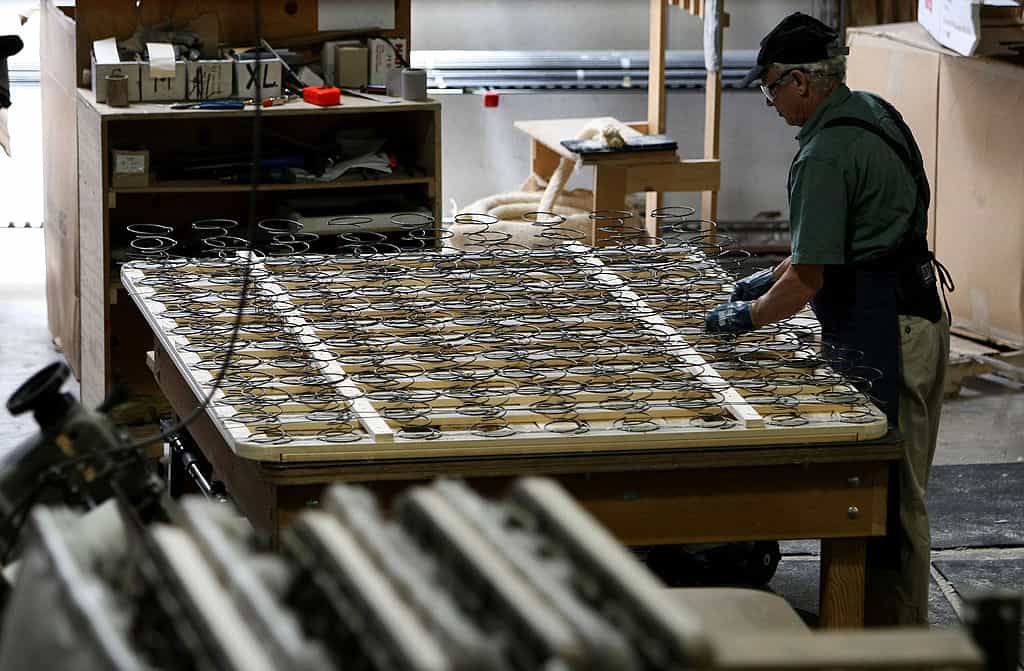
The NAM is advocating for manufacturers’ trade policy priorities as part of a common-sense, comprehensive manufacturing strategy.
What’s going on: A proposed new entry fee on vessels entering U.S. ports would result in higher goods costs for consumers, according to the NAM. The administration is also proposing to put new tariffs on imported copper, timber and lumber products.
- The administration should instead “pursue a comprehensive manufacturing strategy that will create predictability and certainty to invest, plan and hire in America,” as the NAM recently told the Commerce Department.
Port fee would harm consumers: In February, the USTR put forth a proposal to charge up to $1.5 million for Chinese ships entering U.S. ports of call—but it’s a move the NAM said would prove harmful if put into effect.
- “This approach would effectively impose the minimum fee on nearly 100% of vessels making calls on U.S. ports, adding an estimated $600–$800 for each twenty-foot equivalent container unit. Shippers likely would pass the entirety of this cost through to their business customers, in many cases further raising the cost of manufacturing in the U.S,” the NAM told U.S. Trade Representative Jamieson Greer.
- In fact, manufacturers are already getting upwardly revised quotes of at least $1,500 more per container, the NAM continued.
- Instead of implementing the new fee, the USTR “should seek to directly remedy the non-market practices and subsidization of Chinese state enterprises that undermine global competition in the shipbuilding industry,” the NAM said.
Copper: The administration recently launched an investigation into whether copper imports pose a threat to national security.
- Though copper is critical to modern manufacturing, the U.S. copper sector’s vertical supply chain is currently “only capable of meeting 53% of domestic demand for refined copper cathode.” This makes importing copper necessary, the NAM told Commerce Secretary Howard Lutnick earlier this month.
- The NAM supports the Trump administration’s efforts to increase U.S. copper production and processing. Rather than impose tariffs, the administration should employ an NAM-crafted strategy: one that focuses “on making pro-growth tax reforms permanent, expediting permitting reform, restoring regulatory certainty, strengthening the manufacturing workforce and implementing effective trade policy,” the NAM told Lutnick.
Timber: The administration has also begun to investigate timber and lumber imports, and President Trump has promised to prioritize increasing U.S. timber production to decrease American reliance on imports. The NAM agrees, it told Lutnick in a separate communication—but new tariffs are not the answer.
Manufacturers Speak About Impact of Tariffs
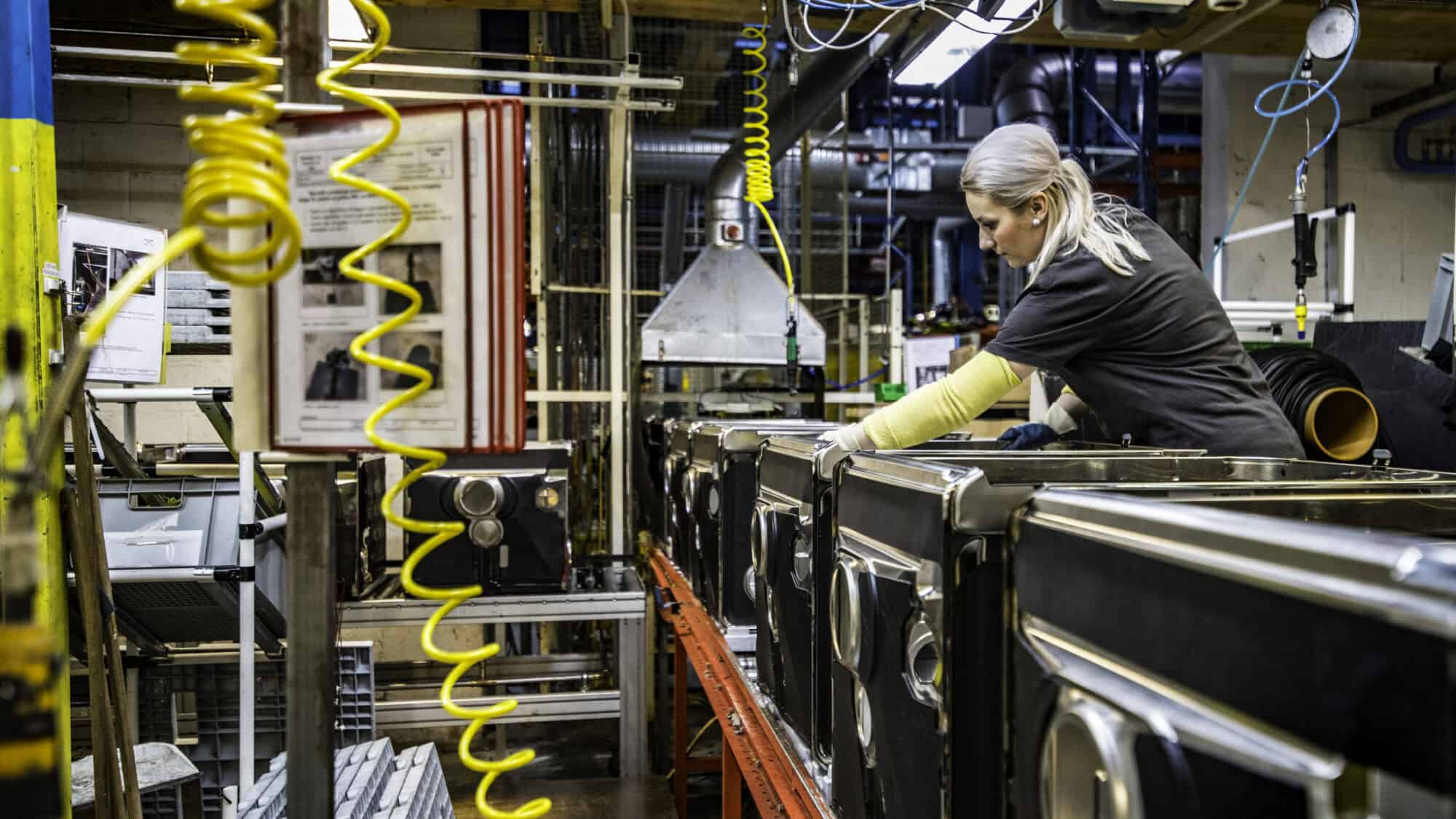
Across the country, manufacturers are telling their stories of shop floor operations under U.S. tariffs, the first of which went into effect March 13. The consensus: tariffs have made things harder all around
- Jeremy Rosenbeck is president of Cincinnati, Ohio–area manufacturer Republic Wire, Inc., which makes copper wire products for the construction industry. In anticipation of tariffs, Rosenbeck “over the winter [ordered] an extra two months’ worth of copper rod (worth tens of millions) to give him enough tariff-free raw material for his business if a new trade agreement isn’t quickly worked out” (Cincinnati Enquirer).
- Republic Wire has nearly 200 employees and each year does approximately $500 million in sales. About 10% of that is outside the U.S.
- Rosenbeck, who says he “understand[s] what they’re trying to do with the tariffs,” nonetheless told the Enquirer that spring is a bad time for uncertainty in the construction sector, as it’s when builders make their plans for the rest of the year. “Higher prices on materials could mean fewer construction projects, which could mean a slowdown for the industry, fewer jobs and a drag on the economy as a whole,” the outlet notes.
Where the burden falls: Chuck Dardas, president and chief operating officer of 67-year-old Michigan automotive manufacturing firm AlphaUSA, wrote in a recent op-ed for The Detroit News that while the Trump administration says tariffs will rebalance the scales, “the truth is that the burden falls squarely on American manufacturers and, ultimately, the American consumer.”
- For AlphaUSA, that’s because “as an S Corporation, our net income flows directly to our tax returns,” Dardas wrote. “If tariffs wipe out our income, it’s akin to a 100% income tax. There’s no profit, no reinvestment and no sustainability. This isn’t just a theoretical concern—it’s a very real possibility. If our paycheck goes to zero, how do we pay our bills? How do we reinvest in our business? How do we survive?”
- The sticker prices of vehicles are too high already, “and these tariffs will only push them higher. Inflationary pressures are mounting, and the Federal Reserve’s decision to hold off on rate changes underscores the precariousness of the situation.”
- Opposition to the tariffs, Dardas continued, “is not about politics. It’s about facts.” Manufacturers that rely on foreign imports cannot simply make the change to domestic sourcing with the flip of a switch. “[E]ven if we could pivot back to American manufacturers for … particular components, that’s not saying that they’re going to be less expensive” domestically, he said this week on radio show “All Talk with Kevin Dietz .” “They could be even more than the tariffs we could very well be faced with still buying the parts from Canada.”
“An existential threat”: If the tariffs remain in place long term, small manufacturers might not be able to hold out long enough to see their promised benefit, either, Dardas told the BBC’s “World Business Report” late last month.
- “If these go on for a long period of time, it’s an existential threat to companies our size,” he said. “We’re not that big, and there [are] a lot of us [smaller manufacturers] out here as well.”
As Tariffs Hit, Manufacturers Brace for Impact
Urge Congress to Act Now on a Comprehensive Manufacturing Strategy That Starts with Making the 2017 Tax Reforms Permanent
Washington, D.C. – National Association of Manufacturers President and CEO Jay Timmons released the following statement on the latest tariffs announced today:
“Needless to say, today’s announcement was complicated, and manufacturers are scrambling to determine the exact implications for their operations. The stakes for manufacturers could not be higher. Many manufacturers in the United States already operate with thin margins. The high costs of new tariffs threaten investment, jobs, supply chains and, in turn, America’s ability to outcompete other nations and lead as the preeminent manufacturing superpower.
“Manufacturers build things in America to sell around the world—and manufacturers in America share President Trump’s goal of supporting manufacturing investment, growth and expansion here at home. The president has the opportunity to achieve this vital goal while also minimizing disruptions and cost increases across our industry. To empower manufacturers to drive the U.S. economy, the administration should:
- minimize tariff costs for manufacturers that are investing and expanding in the U.S.;
- ensure tariff-free access to critical inputs that manufacturers use to make things in America; and
- secure better terms for manufacturers by negotiating ‘zero-for-zero’ tariffs for American-made products in our trading partners’ markets—that means they don’t charge us, and we don’t charge them.
“A clear, strategic approach to trade must be part of a comprehensive manufacturing strategy that starts with an urgent appeal to Congress to make the 2017 tax reforms permanent. When these tax cuts were signed into law, it was rocket fuel for manufacturing in America and made the U.S. economy more competitive on a global scale. Manufacturers will work with the Trump administration and Congress to advance policies that help manufacturers grow and thrive—because when manufacturing wins, America wins.”
Background: In March, the NAM released its Q1 2025 Manufacturers’ Outlook Survey, highlighting rising concerns within the industry over trade uncertainties and increasing raw material costs. Trade uncertainties surged to the top of manufacturers’ challenges, cited by 76.2% of respondents—up 20 percentage points from the last quarter of 2024 and 40 points from the third quarter. Increased raw material costs was the second most cited concern, noted by 62.3% of respondents. These trade-related pressures contributed to a slight dip in overall optimism for their companies in the first quarter of 2025, down modestly from 70.9% in the fourth quarter to 69.7%.
According to another recent NAM survey of its members regarding the impact of tariffs on manufacturers, 87% of small and medium-sized manufacturers indicated that they may need to raise prices, and one-third could slow hiring.
-NAM-
The National Association of Manufacturers is the largest manufacturing association in the United States, representing small and large manufacturers in every industrial sector and in all 50 states. Manufacturing employs nearly 13 million men and women, contributes $2.93 trillion to the U.S. economy annually and accounts for 53% of private-sector research and development. The NAM is the powerful voice of the manufacturing community and the leading advocate for a policy agenda that helps manufacturers compete in the global economy and create jobs across the United States. For more information about the NAM or to follow us on Twitter and Facebook, please visit www.nam.org.
ICYMI: NAM’s Jay Timmons Discusses Tariffs, Tax Reform, Manufacturing Investment on CNBC’s “Worldwide Exchange”
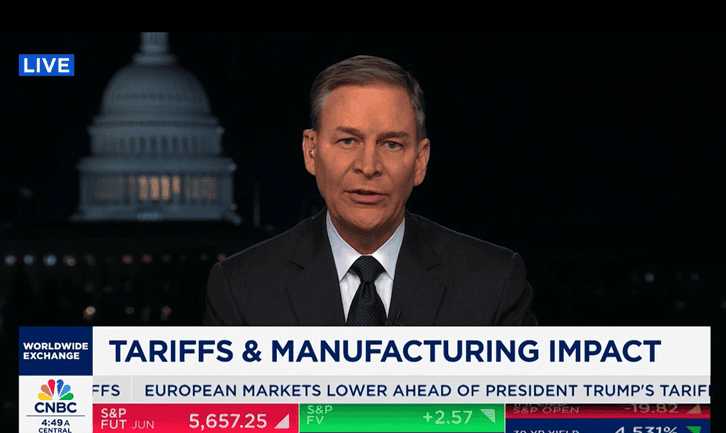
Watch Jay Timmons on “Worldwide Exchange”
Timmons on Upcoming Tariff Announcement
“We don’t know what the actual proposal is going to be, or the actual plan is going to be from the president today, but in any scenario, it’s going to add cost to manufacturers, especially for those inputs that are coming into the United States for finished goods and already finished products. So manufacturers are bracing. We’ve got 14,000 members right now who, frankly, don’t know what the future holds in terms of additional costs, and that’s why you’re seeing this type of concern and sentiment among manufacturers. In fact, three-quarters of manufacturers who we surveyed rate trade uncertainty as their number one concern right now.”
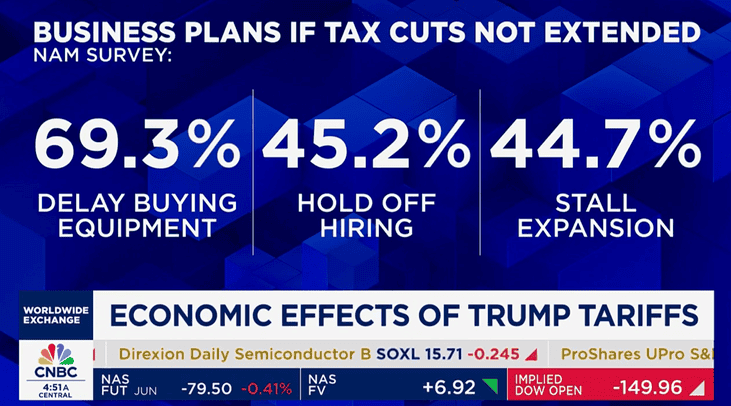
Timmons on Tax Reform, Lowering Costs for Manufacturers
“I think it’s pretty safe to say that everybody would like more things made here in this country, because that’s good for the economy. That’s good for jobs. What is not good, though, is driving up the cost of actually making those things here in the United States. So the first thing that we need … is we need to see Congress, frankly, do its job and get the tax reforms from 2017 renewed, so that … we have the certainty in the tax code. Also the administration is working on reducing the regulatory burden. That’s a lot of costs. That’s about $50,000 per employee per year for a small manufacturer. And then, of course, energy inputs and the cost of energy is important, as well as workforce challenges. We have 500,000 open jobs, for instance, in manufacturing today. So you add all that up, if we could have those advancements and those things that will bring costs down, that’s good for investment here in the United States. Adding costs for inputs, like critical minerals, for instance, really does not help us in the long term.”
…
“There was a lot of enthusiasm when the president came in and talked about strengthening manufacturing here in the United States, talked about an agenda that would lower costs. … If we don’t get the tax reforms renewed, that is an additional cost. If tariffs are imposed, that’s an additional cost. So that’s why you’re seeing consumer sentiment lower. You’re seeing the PMI index that … is now in contraction. That means that manufacturers are putting these decisions on hold. They’re waiting to see whether they should invest and hire, and that’s not good for the economy.”
-NAM-
The National Association of Manufacturers is the largest manufacturing association in the United States, representing small and large manufacturers in every industrial sector and in all 50 states. Manufacturing employs nearly 13 million men and women, contributes $2.93 trillion to the U.S. economy annually and accounts for 53% of private-sector research and development. The NAM is the powerful voice of the manufacturing community and the leading advocate for a policy agenda that helps manufacturers compete in the global economy and create jobs across the United States. For more information about the NAM or to follow us on Twitter and Facebook, please visit www.nam.org.
